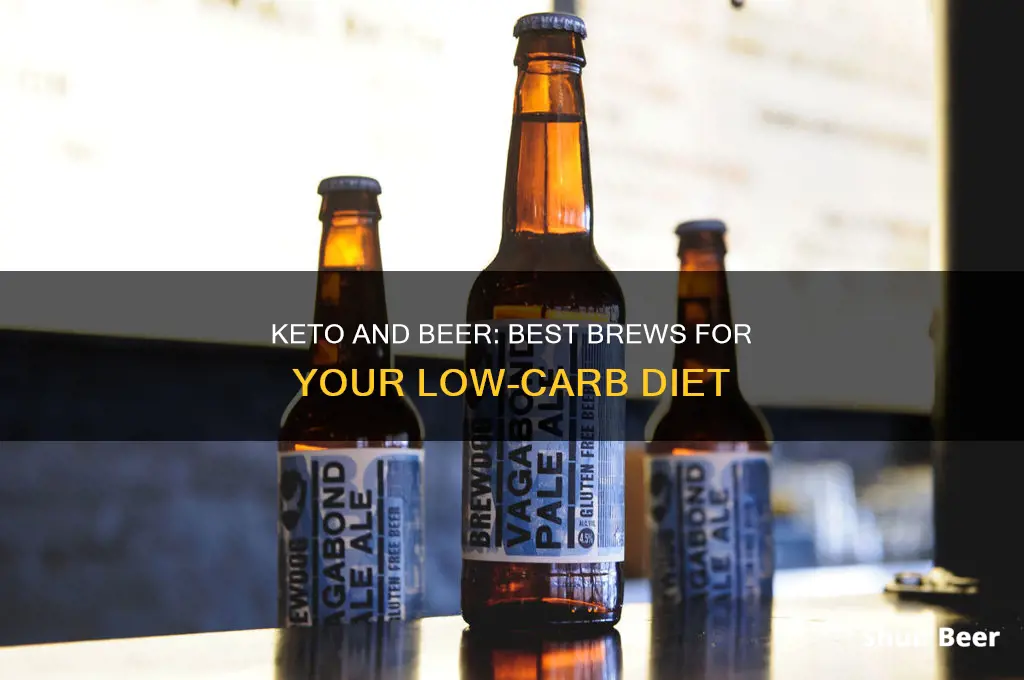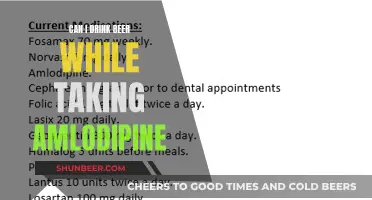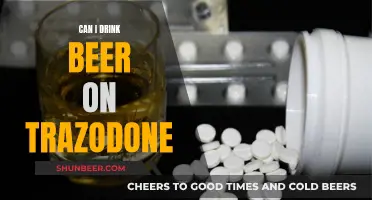
The ketogenic diet is a popular low-carb, high-fat diet that offers many health benefits, including weight loss. While on the keto diet, your body goes into a state of ketosis, where it burns fat for energy instead of glucose. This means that high-carb treats are off-limits. But what about alcohol? Can you still enjoy a beer while on the keto diet?
The short answer is yes, you can drink alcohol on the keto diet, but there are some important things to keep in mind. Firstly, not all alcoholic drinks are created equal when it comes to carb content. Wine, for example, is a more keto-friendly option than beer. Pure spirits like gin, vodka, tequila, and whiskey also contain zero carbs, but it's important to watch out for sugary mixers.
Secondly, while drinking alcohol won't stop ketosis, it will impact it. Alcohol can slow down your rate of ketosis, as your body may use alcohol for energy instead of fat. This can stall your progress, so it's important to drink in moderation and monitor your carb intake.
So, if you're following the keto diet and craving a beer, what should you do? Luckily, there are some light beers that are very low in carbs, such as Corona Premier, Miller Lite, and Bud Light Next. These beers can be enjoyed in moderation without completely derailing your progress. However, keep in mind that drinking alcohol on the keto diet may also lead to worse hangovers and decreased inhibition, making it harder to resist non-keto temptations.
| Characteristics | Values |
|---|---|
| Can you drink alcohol on a keto diet? | Yes, but it will impact ketosis. |
| What alcoholic drinks are keto-friendly? | Pure spirits (gin, vodka, tequila, whiskey, rum), dry wines, light beers, kombucha, mead, and low-carb cocktails. |
| What alcoholic drinks are not keto-friendly? | Beer, tonic water, regular soda, sweet wines, and cocktails with fruit juice or soda. |
| How does alcohol affect the body when on a keto diet? | Alcohol is treated as a toxin by the body and is prioritised over fat for energy, which slows down ketosis. Alcohol can also lower inhibitions, making it harder to resist non-keto foods. |
| How much alcohol can you drink on a keto diet? | It is recommended to drink in moderation and monitor carb intake. One or two drinks are unlikely to affect ketosis, but more than that could kick you out of it. |
What You'll Learn
- Pure spirits like vodka, gin, tequila, whiskey, and rum contain zero carbs
- Beer is not keto-friendly due to its high carb content
- Dry wines are keto-friendly and contain fewer carbs than dessert wines
- Alcohol will slow down the rate of ketosis
- Drinking alcohol while on the keto diet can make your hangovers worse

Pure spirits like vodka, gin, tequila, whiskey, and rum contain zero carbs
Pure spirits such as vodka, gin, tequila, whiskey, and rum contain zero carbs and are thus suitable drink choices for people following a keto diet. These drinks are low-calorie and contain no added sugar or carbs. They can be consumed plain or mixed with low-carb options like soda water, diet soda, or sugar-free tonic water.
When it comes to alcoholic beverages, most contain carbohydrates. The keto diet is a low-carb, high-fat diet that promotes weight loss by maintaining muscle. By reducing carbohydrate intake, the body breaks down fat reserves, resulting in a state of ketosis. To stay within the keto diet's daily carb limits, it's important to choose alcoholic drinks with lower carb content.
While beer typically has a higher carb content, there are light and low-carb options available, such as Corona Premier, Miller Lite, and Beck's Premier Light. These beers usually have less than 5g of carbs per serving, allowing keto dieters to enjoy an occasional beer without compromising their progress.
In addition to pure spirits and low-carb beers, dry wine varieties, including red, white, and sparkling wine, are also keto-friendly. These wines contain fewer carbs and sugar than dessert wines, with 150ml of red wine containing 3.92g of sugar and a similar amount of white wine containing 3.90g. However, it's important to consume these wines in moderation to stay within the recommended daily carb and sugar limits.
For those on a keto diet, it's crucial to monitor carb intake and practice moderation when consuming alcohol. Additionally, be cautious of mixers, as they can add carbs and sugar to your drink.
Beer and Medication: Safe or Not?
You may want to see also

Beer is not keto-friendly due to its high carb content
To stay within the daily carb limits, it is recommended to choose low-carb beer options. Some light beers, such as Corona Premier, Miller Lite, and Bud Light Next, contain fewer carbs, with Miller Lite having only 3.2 grams of carbs per can. These options can be enjoyed occasionally without completely derailing your keto progress.
However, it is important to note that even with low-carb beers, drinking in excess can still impact your keto diet. Alcohol is treated as a toxin by the body, and when consumed, the liver prioritises processing it over breaking down fat reserves. This can slow down the process of converting fatty acids into ketones, which is the basis of the keto diet.
Additionally, drinking alcohol can also affect your decision-making, potentially leading to poor food choices and increased cravings for non-keto foods. As such, it is crucial to monitor your consumption and be mindful of the potential impact on your diet.
In conclusion, while it is possible to include the occasional low-carb beer in your keto diet, it is important to do so in moderation and with careful consideration of its potential impact on ketosis and your overall diet.
Beer and Retainers: What You Need to Know
You may want to see also

Dry wines are keto-friendly and contain fewer carbs than dessert wines
The ketogenic diet is a low-carb, high-fat diet that offers many health benefits, including weight loss. Most alcoholic beverages contain carbohydrates, so choosing ones with fewer carbs can help a person remain within the daily limits of the keto diet.
Dry wines, including red, white, and sparkling wine, are keto-friendly options because they contain fewer carbs and sugar than dessert wines. For example, 150ml of red wine contains only 3.92g of sugar, and a similar quantity of white wine contains 3.90g. A glass of champagne or sparkling wine contains an average of 4.68g of carbs per glass, so enjoying a small glass to celebrate a special event should fit within most keto diet plans.
When it comes to finding keto-friendly wines, your safest bet is to choose dry wines. Wines with high residual sugar will taste sweet, while dry, crisp, acidic wines are relatively low-carb. However, even wines marketed as dry can contain up to 30 grams of residual sugar per liter, so a true zero-sugar wine is hard to come by. Wines from France, Italy, and Greece are usually drier, as is anything categorized as "bone dry" or "brut."
Some of the best keto-friendly white wines include Sauvignon Blanc, Chardonnay, Pinot Grigio, Pinot Blanc, and Riesling. Sauvignon Blanc contains the least amount of carbs and sugars, making it a top dry keto wine choice. Chardonnay is a full-bodied wine with 3.2 grams of carbs per glass. Pinot Grigio and Pinot Blanc are nutritionally similar, with around 3.8 grams of carbs per serving. Riesling is a light golden, medium-bodied wine with a bite of acidity and relatively low alcohol. It has a higher carb count at 5.5 grams per glass, but one glass won't kick you out of ketosis.
The best keto-friendly red wines include Pinot Noir, Merlot, Cabernet Sauvignon, Syrah, and Red Zinfandel. Pinot Noir has just 3.4 grams of carbs per serving. Merlot and Cabernet Sauvignon are the most popular reds in America, with Merlot having a slight advantage with 3.7 grams of carbs compared to Cabernet's 3.8 grams. Syrah is a full-bodied, dry red with a slightly higher alcohol level and rich flavors, making it perfect for pairing with a rich meal or drinking on its own. At just 4 carbs per glass, most keto dieters can enjoy a glass or two without compromising their diet. Red Zinfandels are full-bodied and flavorful, pairing well with red meat and other rich meals. With 4.2g of carbs per glass, you can easily enjoy a glass with dinner and stay in ketosis.
While drinking alcohol on a keto diet can be tricky, as it can knock you out of ketosis, there are specific types of alcohol that you can drink while maintaining ketosis, including dry wines. It's important to drink in moderation and monitor your carb intake to stay on track with your diet.
Enjoying Beers Responsibly on Work Nights: A Guide
You may want to see also

Alcohol will slow down the rate of ketosis
While it is possible to drink alcohol and remain in ketosis, it will slow down the rate of ketosis and therefore the effectiveness of the keto diet. This is because the liver will prioritise processing alcohol over fat, which is what produces ketones for energy.
The keto diet is a low-carb, high-fat diet that aims to put the body into a state of ketosis, where the body uses ketones for energy instead of glucose, resulting in weight loss. As alcohol is also a source of energy, when you drink, the body will use the alcohol for energy instead of breaking down fat reserves. This can stall your progress.
Alcoholic drinks vary in their carbohydrate content, with beer and cocktails containing a lot of carbs, and wine and spirits containing fewer. A low-carb alcoholic drink may be a better choice for someone on the keto diet, but it is still important to drink in moderation.
If you are following the keto diet for medical reasons, such as to treat diabetes or epilepsy, it is best to avoid alcohol altogether.
Skunked Beer: Is It Safe to Drink?
You may want to see also

Drinking alcohol while on the keto diet can make your hangovers worse
When you drink alcohol, your body metabolizes it differently, prioritizing the breakdown of ethanol, which is identified as a toxin. This process shifts your body from burning fat to burning off alcohol, which can slow down your weight loss journey. Additionally, the keto diet is a natural diuretic, causing you to lose excess water and electrolytes, which can lead to dehydration.
When you combine alcohol consumption with the keto diet, the risk of dehydration increases significantly. This is because both alcohol and the keto diet cause you to urinate more frequently, and when your body is not retaining enough water, it can lead to dehydration, one of the main causes of hangover symptoms.
To minimize the risk of dehydration and reduce the severity of hangovers while on the keto diet, it is crucial to stay hydrated by drinking water and replenishing electrolytes. It is also important to drink in moderation, as alcohol can affect your judgment and willpower, making it easier to stray from your diet. Additionally, your alcohol tolerance will be lower on the keto diet, so it is essential to take it slow and understand your body's new limitations.
While drinking alcohol on the keto diet can be challenging, some alcoholic beverages are considered keto-friendly. These include pure spirits like gin, whiskey, vodka, and tequila, as well as dry wines such as Cabernet Sauvignon, Chardonnay, or dry Riesling. Light beers, such as Corona Premier, Miller Lite, and Beck's Premier Light, are also lower in carbs and can be enjoyed in moderation. However, it is important to remember that the best way to avoid a hangover is to avoid drinking alcohol altogether.
Beer and Claritin: Safe Mix or Health Risk?
You may want to see also
Frequently asked questions
Yes, you can drink alcohol and stay in ketosis. However, drinking alcohol will slow down your rate of ketosis. It is recommended to limit your consumption to one drink per day for women and two drinks per day for men.
Pure spirits like gin, whiskey, vodka, and tequila are suitable drink choices as they are low-calorie and contain zero carbs and zero added sugar. Dry wine varieties, including red, white, and sparkling wine, are also keto-friendly options. Light beers such as Corona Premier, Miller Lite, and Bud Light Next are low-carb options.
Beer is generally not recommended on a keto diet due to its high carb content. Tonic water, regular soda, and sweet wines like Moscato should also be avoided as they contain a lot of sugar. Mixed drinks such as margaritas, sangria, and piña coladas are high in carbs and should be consumed sparingly.
Alcohol can impact your body differently when you are in ketosis. You may feel drunk faster and experience worse hangovers. Alcohol can also lower your inhibitions, making it harder to resist non-keto temptations and leading to overeating.
It is important to monitor your carb intake and ensure that it does not exceed the recommended daily limit. Choose low-carb mixers such as soda water, diet soda, or sugar-free tonic water. Limit your consumption to one or two drinks to avoid negative health impacts.







